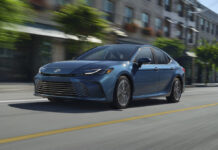
The move is poised to be Trump’s most aggressive yet.
In an effort to bolster the American car industry, President Trump planned to impose tariffs on important vehicles from Europe and Japan. However, he announced Friday that his administration would delay those plans for six months to reach a trade deal.
If the U.S. fails to reach a trade deal with its allies in that 180-day time frame, Trump said he would decide “whether and what further action needs to be taken,” according to a New York Times report. That may ultimately mean imposing a 25 percent tariff on imported European and Japanese cars.
Delaying the tariffs comes as a relieving sign to automakers, as sales have already been declining from previous record-breaking years. However, further negotiations between governments are likely to be tense, as the U.S. has made little headway with the European Union, which has not budged much on easing trade restrictions on American-sourced goods. As the Trump administration has already levied $250 billion in tariffs against Chinese goods, this decision may mean significantly higher prices for foreign cars in the near future. The U.S. also imposed stiff tariffs on steel and aluminum, and industry analysts see further escalation as damaging to the economy.
![American Automakers in Trouble After Share Prices Drop, Profit Projections Shrink [News]](https://tflstudios.wpengine.com/wp-content/uploads/2018/07/Mustang-enters-China-at-the-port-1024x680.jpg)
Industry, government response
According to the New York Times, government and industry outcry on the proposed tariffs did not dissuade Trump’s decision. Instead, officials thought this was not the best time to impose new tariffs. The U.S. government is currently in trade negotiations with China, as well as attempting to pass a new North American trade agreement. Adding European and Japanese tariffs on that would impact officials’ ability to broker trade deals with some, if not all, parties involved.
President Trump has repeatedly threatened tariffs as a necessary measure to protect the interests of the American car industry. In doing so, the administration believes it can achieve some concessions from other countries.
The U.S. Department of Commerce’s investigation into automotive imports found that certain parts and vehicles threatened the nation’s national security. “United states defense and military superiority depend on the competitiveness of our automobile industry and the research and development that industry generations,” the White House announced Friday.
Economists and industry experts, however, say that tariffs would raise the costs of American cars as well. The Center for Automotive Research estimates the cost of a new vehicle could rise by $455 to $6,875, depending on the specifics of new tariffs. President of Global Automakers John Bozzella decried the proposed tariffs. “The idea that U.S. automakers are threatened by automotive imports is fundamentally flawed and ill-conceived. No automaker or auto parts supplier asked for this ‘protection’.”
While tariffs would likely have an effect on the volume of imports from Japan, the country’s minister for economic and fiscal policy, Toshimitsu Motegi, said the U.S. would not explicitly restrict the volume of imports coming from Japan. “I have confirmed with the U.S. side that they wouldn’t seek such a measure.” President Trump and Japanese Prime Minister Shinzo Abe have a relatively close relationship. Japanese officials are hoping that will result in a better set of trade deals between the two nations.
President Trump plans to visit Japan next week, including a state dinner with the Prime Minister as well as the nation’s new emperor and empress.

























